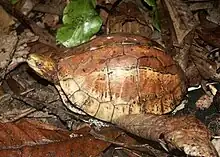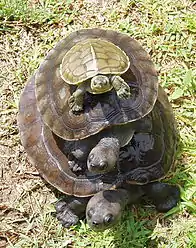| Indochinese box turtle | |
|---|---|
 | |
| Northern Vietnamese box turtle Cuora galbinifrons galbinifrons | |
| Scientific classification | |
| Domain: | Eukaryota |
| Kingdom: | Animalia |
| Phylum: | Chordata |
| Class: | Reptilia |
| Order: | Testudines |
| Suborder: | Cryptodira |
| Superfamily: | Testudinoidea |
| Family: | Geoemydidae |
| Genus: | Cuora |
| Species: | C. galbinifrons |
| Binomial name | |
| Cuora galbinifrons Bourret, 1939 | |
| Synonyms[3] | |
| |
The Indochinese box turtle, Vietnamese box turtle, or flowerback box turtle (Cuora galbinifrons) is a species of Asian box turtles from China (Hainan and Guangxi), northern and central Vietnam, Laos, and possibly northeastern Cambodia. It is found in high altitude woodland where it tends to hide in the undergrowth. There is considerable confusion as to the taxonomy of this species with several subspecies being recognised by some authorities. and not by others. The International Union for Conservation of Nature has rated its conservation status as "critically endangered".
Taxonomy
The northern Vietnamese box turtle C. g. galbinifrons was described by Bourret in 1939, but it took nearly 40 years until the first specimens were imported to Europe and the United States. This subspecies occurs in extreme southern Guangxi Province, China, northern Vietnam, and probably northern Laos and on Hainan Island (China). The population from Hainan was once considered to represent a distinct species[4] or at least subspecies,[5] C. (galbinifrons) hainanensis.[6] Li, 1958, was not aware of the description from Bourret (1939) of C. galbinifrons and thus believed to have a new subspecies of Cuora flavomarginata the only Cuora species known at this time with at least some similarities. According to some, specimens from Hainan do not always have fully black plastrons (always the case in mainland C. g. galbinifrons), but sometimes lighter parts. Furthermore, their carapaces show more red pigmentation and brown spots. Genetic and morphologic studies believe it to be a synonym of C.g. galbinifrons, however.
The central Vietnamese flowerback box turtle (Cuora (galbinifrons) bourreti) occurs in central Vietnam and adjacent Laos, and possibly in northeastern Cambodia. The most notable difference to the nominate race is the distinct plastral pattern, where only smaller black blotches (sometimes none at all) occur.
Described as a subspecies[7] of C. galbinifrons, genetic studies[8] have shown it to be quite distinct, possibly to the extent of a separate species, i.e., Cuora bourreti as is the case with Cuora picturata,[9] once also considered a subspecies of C. galbinifrons. However, osteologic studies[10] have shown that C. g. bourreti probably better remains as a subspecies of C. galbinifrons. This is also substantiated by the finding of intergradation zones in north-central Vietnam, where hybrid populations of C. g. galbinifrons and C. g. bourreti are known to exist.[11] The status of C. picturata is uncertain, while this is the morphologically and phenotypically the most distinct variety, authors[12] treat it as a subspecies of C. galbinifrons again. Herein, it is treated as a separate but closely related species.
Specimens of at least the northern and central Vietnamese taxa hybridize—apparently in the wild—with keeled box turtle males to produce the turtles once considered a separate species or subspecies, Cuora serrata.
Status
All populations of Indochinese box turtle are in decline and the conservation situation is made more acute by the diversity of subspecies. Without trying to resolve these taxonomic issues, the International Union for Conservation of Nature has rated the conservation status of the species as "critically endangered".[1]
Gallery
 C. g. galbinifrons, dorsal view (Hainan)
C. g. galbinifrons, dorsal view (Hainan) C. g. galbinifrons, plastral view (Vietnam)
C. g. galbinifrons, plastral view (Vietnam) C. g. bourreti, lateral view, light-colored variety (Cambodia/Laos)
C. g. bourreti, lateral view, light-colored variety (Cambodia/Laos) C. g. bourreti, plastral view of the dark-colored Vietnamese variety
C. g. bourreti, plastral view of the dark-colored Vietnamese variety C. g. bourreti, lateral view of the dark-colored Vietnamese variety
C. g. bourreti, lateral view of the dark-colored Vietnamese variety
References
- 1 2 Li, P.; McCormack, T.; Rao, D.-Q.; Shi, H.; Stuart, B.L.; Wang, L. (2020). "Cuora galbinifrons". IUCN Red List of Threatened Species. 2020: e.T97357437A123816666. doi:10.2305/IUCN.UK.2020-2.RLTS.T97357437A123816666.en. Retrieved 19 November 2021.
- ↑ "Appendices | CITES". cites.org. Retrieved 2022-01-14.
- ↑ Fritz Uwe; Peter Havaš (2007). "Checklist of Chelonians of the World" (PDF). Vertebrate Zoology. 57 (2): 216–217. Archived from the original (PDF) on 1 May 2011. Retrieved 29 May 2012.
- ↑ Zhao, 1975
- ↑ Iverson & McCord, 1992
- ↑ Li, 1958: org desc. Cyclemys flavomarginata hainanensis)
- ↑ Obst & Reimann, 1994
- ↑ Stuart & Parham 2004
- ↑ Lehr et al. 1998
- ↑ Fritz et al.. 2006
- ↑ Fritz et al.. 2003
- ↑ Fritz & Havas (2006)
- Fritz, Uwe; Auer, Markus & Petzold, Antje (2006). "Osteology in the Cuora galbinifrons complex suggests conspecificity of C. bourreti and C. galbinifrons, with notes on shell osteology and phalangeal formulae within the Geoemydidae". Amphibia-Reptilia. 27 (2): 195–205. doi:10.1163/156853806777240029.
- Fritz, U., Ziegler, T., Herrmann, H.-W., Lehr, E., 2002. Intergradation between subspecies of Cuora galbinifrons Bourret, 1939 and Pyxidea mouhotii (Gray, 1862) in southern North Vietnam. Faun. Abh. Mus. Tierk. Dresden, 23: 59–74.
- Obst, F.J., Reimann, M., 1994. Bemerkenswerte Variabilität bei Cuora galbinifrons Bourret, 1939, mit Beschreibung einer neuen geographischen Unterart: Cuora galbinifrons bourreti subsp. nov. Zool. Abh. Mus. Tierk. Dresden, 48: 125–138.
- Stuart, Bryan L & Parham, James Ford (2004). "Molecular phylogeny of the critically endangered Indochinese box turtle (Cuora galbinifrons)". Molecular Phylogenetics and Evolution. 31 (1): 164–177. doi:10.1016/S1055-7903(03)00258-6. PMID 15019617.
External links
- Cuora galbinifrons galbinifrons - Visual Determination of Subspecies by Chris Tabaka, DVM. Retrieved 2007-SEP-1.

